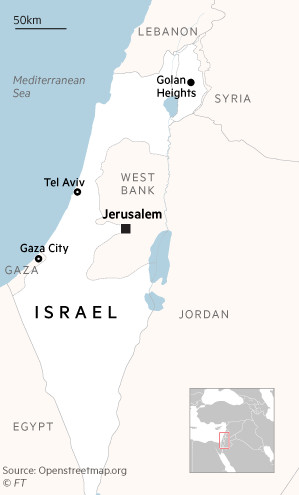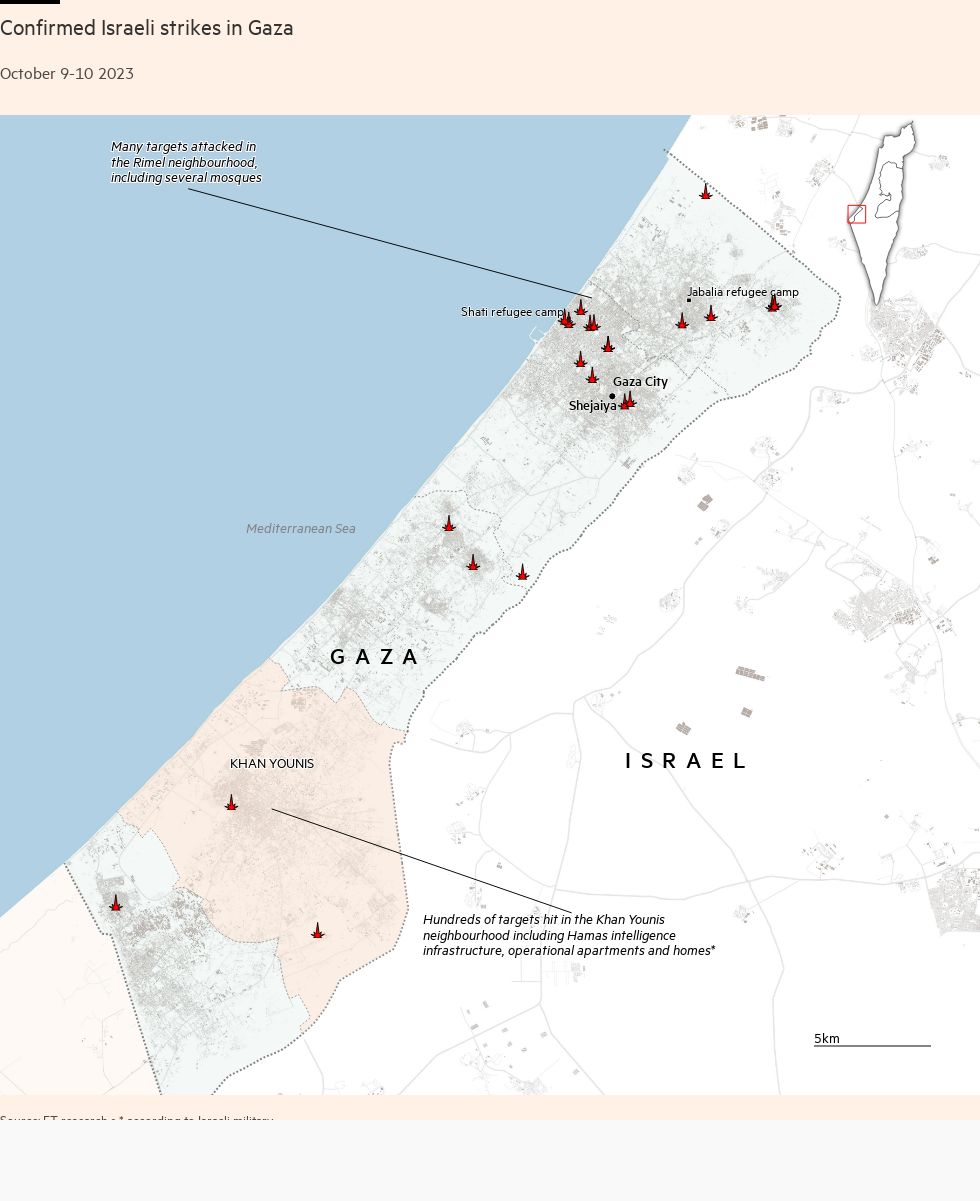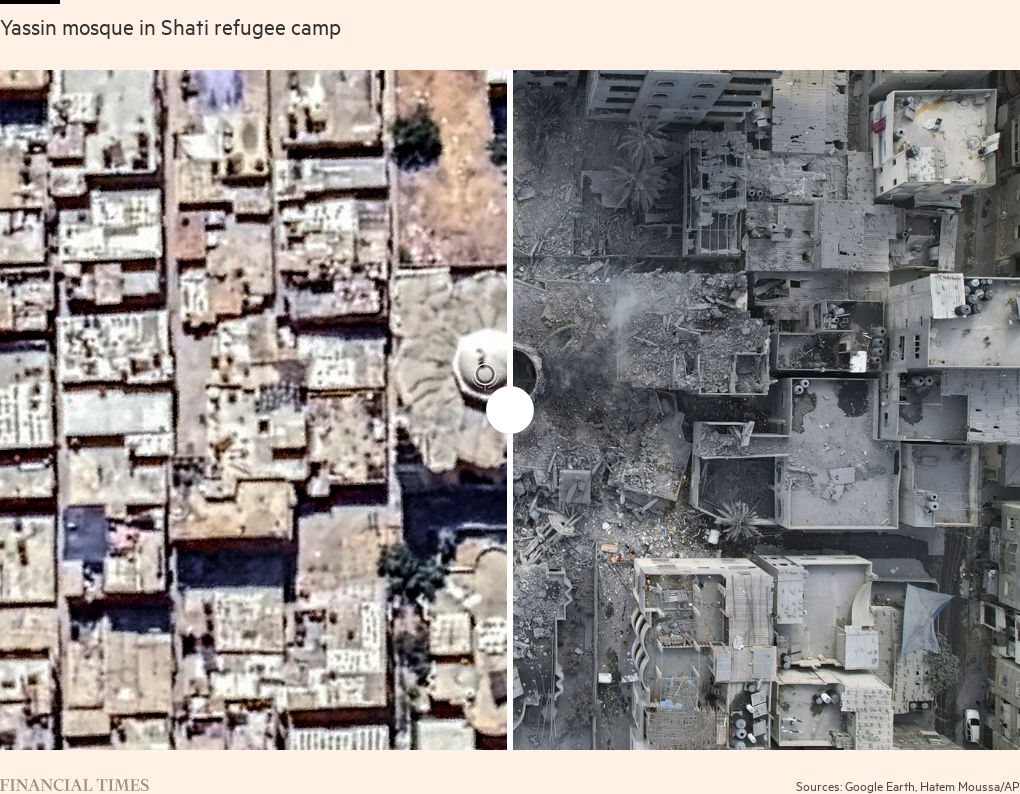Unlock the Editor’s Digest for free
Roula Khalaf, Editor of the FT, selects her favourite stories in this weekly newsletter.

The Israeli military bombarded hundreds of targets in the Gaza Strip and said it had secured its border with the enclave, three days after an incursion by Hamas triggered the worst war on the country’s territory for decades.
Tens of thousands of Palestinians have fled their homes, amid Israeli strikes on Gaza from the air and sea that responded to the weekend assault by the militant group, which killed hundreds of people.
The Israel Defense Forces said it had hit a total of over 1,300 targets so far, including more than 200 overnight, and that 4,500 rockets had been fired from Gaza.
The IDF added that the bodies of 1,500 Hamas militants had been found in Israeli territory and the area near the border with Gaza was now “more or less secure”.
But, as sirens sounded over possible Hamas rockets in Tel Aviv and elsewhere in Israel, the militant group warned it was planning to attack the city of Ashkelon and called on residents to leave.
Israeli targets in Gaza included what the IDF said was a Hamas operational command centre in a mosque, an entry point for a tunnel used by militants and other “operational infrastructure” inside a second mosque.
The IDF also posted on X in Hebrew that it had killed Jawad Abu Shamala, Hamas’s finance chief, in an airstrike.
The Financial Times could not independently confirm the claims. Israel accuses the Palestinian group, which has controlled Gaza since 2007, of embedding military infrastructure in civilian areas and religious sites.
Hamas has threatened to kill a hostage for each Israeli air strike that targets civilians in Gaza without prior warning.
The UN warned it expected that “a severe shortage of already scarce drinkable water” would affect more than 610,000 people in the territory, which Israeli authorities have cut off from water and electricity as part of a “complete siege”.
More than 2mn people live in Gaza, whose borders Israel and Egypt tightly control.
Lynn Hastings, the UN’s humanitarian co-ordinator for occupied Palestinian territories, said the UN was working to provide shelter in Gaza, but that at least two schools that gave refuge had already been damaged by air strikes.
Ahead of a widely expected ground operation into Gaza, Israel said it had fully deployed 35 military battalions and four divisions and was “building an infrastructure for future operations”. It also called up 60,000 reservists in addition to a record 300,000 already mobilised.
Prime minister Benjamin Netanyahu’s Likud party said on Tuesday that the leaders of the country’s ruling coalition had authorised him to negotiate the formation of an emergency government.
While Netanyahu has invited the opposition to join such a government “without preconditions”, Benny Gantz, head of the National Unity party, has called for a slimmed-down “kitchen cabinet”, which would involve pushing aside some of the prime minister’s current far-right coalition partners.
In a speech on Monday evening, Netanyahu said Hamas had made a “mistake of historic proportions” in carrying out Saturday’s attack on Israel.
“We will exact a price that will be remembered by them and Israel’s other enemies for decades to come,” he said.

The IDF said more than 900 Israelis had been killed since Saturday’s assault, with dozens more held hostage in Gaza. It added that 50 families had been notified that their relatives had been taken as hostages.
Gaza’s health ministry said 765 Palestinians had been killed in the enclave. According to the UN, the Israeli bombardment has displaced at least 200,000 people, with electricity only available for three to four hours a day and access to food also restricted.
On Tuesday, the EU, the world’s biggest provider of support to the Palestinians, said it would continue aid payments until it had completed a review into whether the funds would be channelled to Hamas.
The announcement clarified a statement the day before by EU neighbourhood commissioner Olivér Várhelyi that “all payments [were] immediately suspended”. Brussels said he had not consulted fellow commissioners before posting on social media.
An IDF official said that Palestinian civilians should “get out” of Gaza if they could via the Rafah border crossing into Egypt. But the Israeli military later clarified the crossing was now closed and that there was “no official call by Israel for residents of the Gaza Strip to exit into Egypt”.
Israel-Palestinian conflict
In his first comments since this weekend’s attack by Hamas, Russian president Vladimir Putin said on Tuesday the fighting was “a clear example of the failure of US policy in the Middle East”.
The war has raised concerns of a broader regional escalation, including in the north, where Israel faces the Lebanon-based militant group Hizbollah, which is backed by Iran. The US has deployed a naval battle group in the Mediterranean nearby.
Hizbollah said on Monday that it had fired rockets and mortars on two Israeli military posts and that three of its fighters had been killed after crossing the border. Israel said one of its soldiers was killed during an earlier cross-border raid.
Iran’s supreme leader Ayatollah Ali Khamenei said on Tuesday it was “mistaken” to link his regime to Hamas’s attack on Israel even as he praised the “masterminds” behind it.
Khamenei said the assault had inflicted an “irreparable defeat” to Israel’s military and intelligence apparatus that “cannot be easily repaired”.
The Hamas incursion has prompted shock and soul-searching in Israel over the security lapses. The IDF said on Tuesday morning that it was “still counting the bodies” from an attack on revellers at a party near the border, where about 250 had been killed.
Additional reporting by James Shotter in Jerusalem and Max Seddon in Moscow









